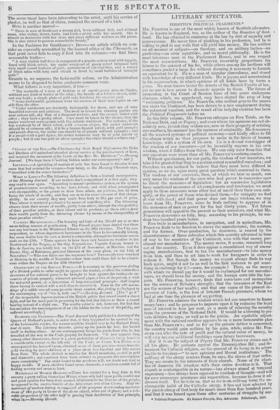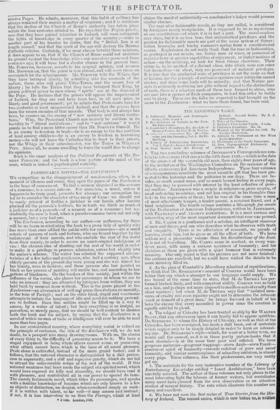LITERARY SPECTATOR.
FORSYTH'S POLITICAL FRAGMENTS.* MR. FORSYTH is one of the most widely known of Scottish advocates. He is known in England, too, as the author of the Beauties of Scot- land. He has attained to eminence at the bar by dint of sagacity and perseverance. He never tires of plodding in his profession. but he is willing to plod in any walk that will yield him money. He has written on all manner of subjects—on theology, and on military tactics—on gardening—on civic squabbles, and on moral philosophy. He is the most laborious man in the Parliament House, and in one respect the most conscientious. Mr. FORSYTH invariably proportions his labour to the amount of his fee, while others among his brethren will sometimes pocket a large fee without deeming it necessary to furnish an equivalent for it. He is a man of singular shrewdness, and stored with knowledge of very different kinds. He is joyous and unrestrained in his conversation, in which opinions of all kinds have by turns a. place. No man knows better the defects of the Scotch Courts of law, yet no one is less prone to dissuade appeals to them. The forms of proceeding in the Court of Session have of late years undergone changes, which, we apprehend, may have stinted the crop of long " reclaiming petitions." Mr. FORSYTH, who neither goes to the moors nor visits the Continent, has been driven to a new employment during the autumnal vacation, and the result of his holyday exercise has been the Political Fragments before us.
. In this little volume, Mr. FORSYTH enlarges on Free Trade, on the National Debt, and on Popery ; and even where his opinions are not ab- solutely new, (which they seldom are, save in their property of refuting one another), his mariner has the raciness of originality. He denounces all the received systems of political economy—and kindly offers to fill the chasm which he thus proposes to make in the fabric of human knowledge, with a system of his own. Ile is a devout worshipper of the wisdom of our ancestors—yet he invariably reposes in his own wisdom, when it differs from theirs. We can only infer from this that our ancestors were wiser than all Mr. FORSYTH'S contemporaries. Without questioning for our parts, the wisdom of our ancestors, we take it for granted that they to a certain extent resembled ourselves; and therefore we are inclined to believe that they must have differed in Opinion, as we do, upon every great question which occurred to them. The wisdom of our ancestors, then, of which we hear so much, can only mean the wisdom of the men who had power in successive ages to direct the measures of legislation : but as successive legislatures have sanctioned measures of all complexions and tendencies, we must apply to these measures some other test of merit than their own anti- quity, or the power of those who devised them,—for antiquity we find at war with itself; and that power does not imply wisdom, we may learn from Mr. FORSYTH, since he finds nothing to approve of in the measures of men in power for the lastthirty years. 'Yet future generations will appeal to the present as their ancestors, and what Mr. FORSYTH denounces as folly, may, according to his principle, be wis- dom two hundred years hence. • Free trade in manufactures, in navigation, and in agriculture, Mr. FORSYTH finds to be freedom to starve the manufacturer, the Seaman, and the farmer. Over-production, he discovers, is caused by the discontinuance of those subsidies which this country advanced in time of war to the countries of the Continent, who with that money pur- chased our manufactures. The money never, it seems, remained long out of the country. To us it does appear a roundabout way of encou- raging manufactures, first to tax the manufacturer—to take money from him, and then to set him to work for foreigners in order to redeem it. But though the money we export always finds its way back again, might it not be as well in the first instance to get some- thing in exchange for it ?—corn, for example ? Then, as the money with which we should pay for it would be exchanged for our manufac- tures, we should have the money, and the foreign corn into the bar- gain. Mr. FORSYTH, however, finds that corn-laws and monopolies are the sources of Britain's strength; that the treasures of the East are the sources of her wealth ; and that one cause of the present de- pression of trade, is the loss of 100,000 French prisoners, whom we had at one time the pleasure of supporting. Mr. FORSYTH admires the wisdom which led our ancestors to frame usury-laws ; and he proposes to improve upon it by reducing the legal rate of interest to four per cent, as a mode of relieving the country from the pressure of the National Debt. ' It would be a blessing to pri- vate debtors, he says, as well as to the public. An equitable adjust- ment with the national creditor appears to us a more honourable plan than Mr. Foasyrx's ; and so far as the private debtor is concerned, the country would gain nothing by his gam, while, unless Mr. FOR- SYTH can alter the rate of profit and the natural value of money, he will on;y impose additional hardships upon future borrowers. But it is on the subject of Popery that Mr. FORSYTH shines outal all his glory. He protests against the Emancipation Bill ; and de- nounces the Catholic religion, on the ground of its being in its ntture hostile to freedom—" to new opinions and liberal institutions." The celibacy of the clergy renders them, he says, the slaves of 06 order. They are sworn to the interests of their church. None of Vie chari- ties of domestic life interfere with their entire devotion to it That church is unchangeable in its nature—has always aimed at temporal supremacy—has always been opposed to freedom of thought—and will for ever encourage ignorance and superstition, because to these it ad- dresses itself. Yet he tells us, that so far from celibacy being the un- changeable habit of the Catholic clergy, it has not been adopted .by the parish &rev of that body for much more than four hundred years, and that it was -forced upon them after centuries of struggles by suc- * Political Fragments. By Robert Forsyth, Esq. Advocate. Edinburgh, 1830.
cessive Popes. He admits, moreover, that this habit of celibacy has always rendered their morals a matter of suspicion ; and it is notorious that the decline of the Church of Rome's authority has taken place within the four centuries alluded to. He says that the Popish priests, now that they have gained toleration in Ireland, will soon extinguish the lights of knowledge in every quarter of the country ;—while in another part of his treatise he states, that the " British lion is at length roused," and that the spirit of the age will destroy the Roman Catholic religion. Certainly, if we must choose betwixt these opinions, it does appear to us, that if the Church of Rome could not maintain its ground against the knowledge which i our ancestors possessed three centinies ago, it will have but a slender chance in the present time. Mr. FORSYTH, however, reverts to his original opinion, and assures Mr. BROUGHAM, that the priest is now abroad, and will soon prove an overmatch for the schoolmaster. Mr. FORSYTH tells the Whigs, I hat they have betrayed liberty, by admitting into the counsels of the nation, those who will prove Ultra-Tories, and the sworn foes of liberty ; he tells the Tories that they have betrayed their King, by giving political power to men whose " spirits" are at the disposal of the Pope. He declares that the priests will oppose the improvement of Ireland, for they are and have been foes, in all ages alike, to liberty and good government yet he admits that Protestants have for two centuries at least misgoverned Ireland, and that the priests have been the sworn enemies of that misrule. That body is and always has been, he assures us, the enemy of " new opinions and liberal institu- tions." Why, the Protestant Church can scarcely be outdone in its hostility to " liberal institutions ;" and to " new opinions" it would puzzle us to find a more bitter enemy than Mr. FORSYTH himself. He is an enemy to freedom in trade—he is an enemy to the free partition of land among children—he is an enemy to freedom in borrowing money—he will not leave the Catholics free to trust in their priests, nor the Whigs in their schoolmaster, nor the Tories in Wieinam PITT. Above all, he seems unwilling to leave the world free to change its opinions.
Such is the exact analysis of the Political Frugments of Mr. Ro- BERT FORSYTH ; and the book is a true picture of the mind of the man, which is indeed a psychological curiosity.



















 Previous page
Previous page